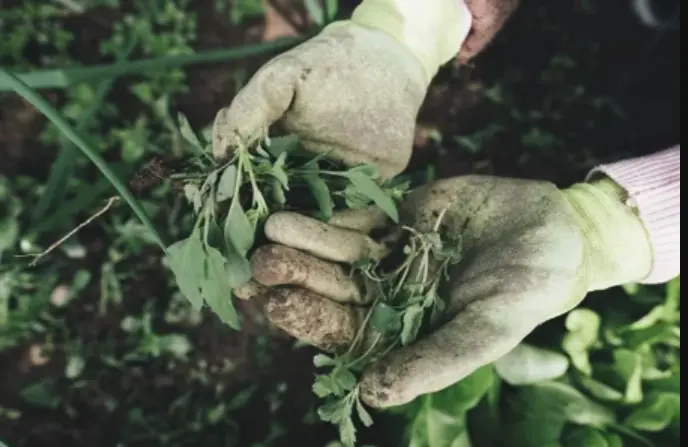Introduction to Weed Management Solutions
Weeds. You see them poking through the walkway, sprouting in the garden, and maybe even creeping into your flower beds. They’re not just eyesores; they’re invaders fighting for the nutrients, water, and sunlight your plants crave. But before you reach for chemical warfare, let’s talk about managing these unruly guests in a way that’s kind to Mother Earth. Weed management isn’t about total annihilation; it’s about control and balance. And guess what? You can achieve this without harming the environment. So, whether you’re dealing with dandelions daring to defy you or crabgrass creeping into your calm, stick around. We’re diving into earth-friendly ways to keep your green space peaceful and prosperous.
Organic Mulching: A Natural Barrier against Weeds
Organic mulching is not just about making your garden look good; it’s a strong defense against weeds. By spreading organic materials like wood chips, straw, or leaves over your soil, you create a barrier that makes it tough for weeds to break through. This method keeps the soil moist, which is great for the plants you want while making it harder for weeds to take hold. Plus, as these organic materials break down over time, they improve your soil’s health by adding nutrients. So, you’re fighting weeds and boosting your soil at the same time. Think of it as a win-win situation for your garden, but a lose-lose for those pesky weeds.
Vinegar Solution: An Eco-Friendly Weed Killer
Vinegar isn’t just for salads—it’s a powerful, eco-friendly weapon against weeds. By mixing a regular household vinegar with a bit of water and some dish soap, you create a non-toxic solution that gets rid of weeds without harming the planet. The acid in vinegar burns the weed leaves upon contact, making it a quick and effective method. Before you start, keep a couple of things in mind. First, vinegar works best on young, tender weeds. For older, tougher weeds, you might need a few applications. Second, because vinegar can harm all plants it touches, be precise. Use a spray bottle to target weeds without hitting your flowers or veggies. Remember, this method doesn’t kill weed roots. So, for a long-term solution, you’ll need to apply it several times or combine it with other methods. Use vinegar, save the earth, and keep your garden clean.
The Power of Corn Gluten Meal: Pre-emergent Weed Control
Corn gluten meal isn’t just for feeding livestock—it’s a secret weapon against weeds in your garden. Made from the leftovers of milled corn, this natural product stops weed seeds from growing into pesky invaders without harming your plants. Think of it as a natural barrier that keeps weeds at bay. Here’s the kicker: corn gluten meal works before weeds even get a chance to show their faces. This makes it a pre-emergent weed control, meaning it tackles the weeds before they emerge from the soil. You’ll want to apply it early in the season, as timing is everything. Aim for when the soil is warming up but before you see any weed growth. This usually means applying it in early spring, but timing can vary based on your local climate. Remember, once weeds have sprouted, corn gluten meal won’t help much with those. It’s all about prevention. Using corn gluten meal is simple and straightforward. Spread it across your garden beds or lawn, and water it in. This not only helps prevent weeds but also adds a bit of nitrogen to the soil, giving your plants a little nutrient boost. It’s a win-win. In summary, corn gluten meal is a powerful, eco-friendly option for keeping your garden weed-free without resorting to harsh chemicals. It’s a natural choice for gardeners who care about their impact on the environment.
Solarization: Using the Sun to Suppress Weeds
Solarization is a powerful trick to clean up your garden without harsh chemicals. Here’s how it works: You cover the soil with clear plastic during the hot summer months. This means the sun’s rays go through the plastic, heating the soil beneath to a level where weeds can’t survive. Think of it as giving weeds a sunburn from which they can’t recover. It’s cheap, effective, and totally eco-friendly. For the best results, leave the plastic on for about four to six weeks during the peak of summer. Remember, solarization is more about patience and less about effort, perfect for gardeners looking for a set-it-and-forget-it solution.
Summary of Top Environmentally Friendly Weed Management Solutions
Ready to tackle weeds without harming our planet? Good. Here’s the lowdown. First, boiling water. Yep, it’s that straightforward. Pour it directly on the weeds. It’s like a reset button for your garden, but only use it where you want everything gone, as it doesn’t discriminate. Next, salt. Not too much, or you’ll harm the soil. Mix a bit with water and say goodbye to weeds. Then there’s vinegar. Acidic and effective, just spray it on the leaves during a sunny day. Remember, it’s non-selective, so target carefully. Moving on, corn gluten meal; a pre-emergent hero. It stops weeds before they start, just sprinkle it around. Lastly, mulch. It’s like a blanket for your soil but also a shield blocking sunlight from weeds. Use organic options like wood chips for an extra eco-friendly punch. Simple, direct, and gentle on the earth. Use these, and you’re all set.



